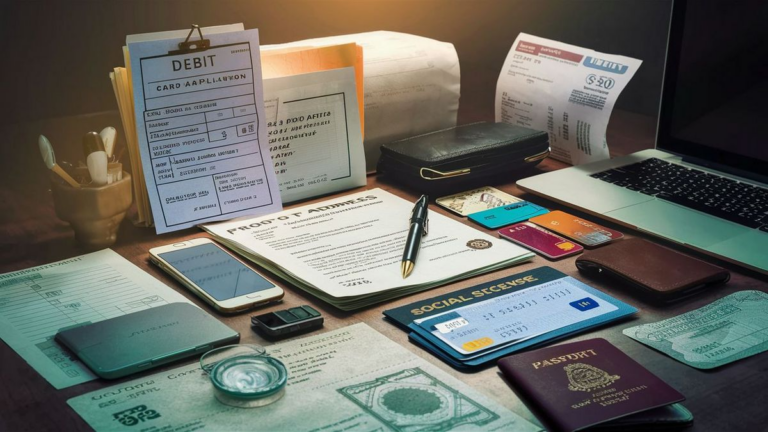Obtaining a debit card is a straightforward process that requires fulfilling certain criteria and providing specific documentation. Whether you’re opening a new bank account or requesting a replacement card, there are standard requirements to meet. Let’s explore what you need to get a debit card.
Proof of Identity
One of the primary documents you’ll need is proof of your identity. This typically involves presenting a government-issued photo ID, such as a driver’s license, passport, or state ID card. These documents help verify your identity and ensure that the card is issued to the correct individual.
Proof of Address
In addition to proof of identity, most financial institutions require proof of address. This can be in the form of a utility bill, lease agreement, or bank statement that displays your name and current address. Providing proof of address helps confirm your residency and contact information.
Minimum Age Requirement
Many banks and credit unions have a minimum age requirement for opening a debit card account. Typically, you must be at least 18 years old to qualify for a card in your name. However, some institutions offer accounts for minors with parental consent or joint ownership.
Bank Account
To obtain a debit card, you’ll need to have a bank account with the issuing financial institution. Whether it’s a checking or savings account, having an active account allows the bank to link the card to your account for transactions.
Application Process
Once you’ve gathered the necessary documentation, the next step is to complete the application process. This may involve visiting a branch location or applying online through the bank’s website. During the application process, you’ll need to provide personal information and consent to the bank’s terms and conditions.
Initial Deposit
Some banks may require an initial deposit to open a new account and receive a debit card. The amount varies depending on the financial institution and the type of account you’re opening. This deposit ensures that there are funds available for transactions and account maintenance fees.
Card Activation
Once your application is approved, you’ll receive your debit card in the mail. Before you can use the card, you’ll need to activate it. This typically involves calling a toll-free number or visiting the bank’s website to verify your identity and activate the card.
Security Measures
It’s essential to understand the security measures associated with your debit card. This includes keeping your PIN (Personal Identification Number) confidential, avoiding sharing your card information online, and promptly reporting any lost or stolen cards to your bank.
Additional Features
Depending on the bank, your debit card may come with additional features such as rewards programs, overdraft protection, or mobile banking capabilities. Familiarize yourself with these features to make the most out of your banking experience.
Getting a debit card involves meeting specific requirements, including providing proof of identity and address, having a bank account, and completing the application process. By understanding these requirements and following the necessary steps, you can obtain a debit card for convenient and secure transactions.
Frequently Asked Questions
- Can I get a debit card if I’m under 18?
While many banks require you to be at least 18 years old to get a debit card in your name, some offer accounts for minors with parental consent or joint ownership. It’s best to check with your bank for their specific policies regarding minors.
Benefits of Debit Cards
Debit cards offer several advantages over other forms of payment. They provide a convenient way to make purchases online and in-person without carrying cash. Additionally, they are widely accepted by merchants and can be used internationally in many cases.
Document Retention
After you’ve obtained your debit card, it’s important to keep all the documentation related to your account in a safe place. This includes copies of your proof of identity, proof of address, and any other paperwork provided by the bank during the application process.
Transaction Monitoring
To help prevent unauthorized transactions, regularly monitor your account activity for any suspicious charges or withdrawals. Most banks offer online banking services or mobile apps that allow you to track your transactions in real-time.
| Document Type | Examples |
|---|---|
| Proof of Identity | Driver’s license, passport, state ID card |
| Proof of Address | Utility bill, lease agreement, bank statement |
Lost or Stolen Cards
If your debit card is lost or stolen, it’s crucial to report it to your bank immediately. Most banks have 24/7 customer service lines for reporting lost or stolen cards. By promptly reporting the loss, you can minimize the risk of unauthorized transactions on your account.
Account Security
Protecting your account information is essential for preventing fraud and unauthorized access. Be cautious when using your debit card online and only make purchases from reputable websites. Additionally, avoid sharing your PIN or card details with anyone.
International Usage
If you plan to use your debit card while traveling abroad, it’s important to notify your bank beforehand. Some banks may require you to set a travel notification to prevent your card from being blocked for suspicious activity while overseas.
Transaction Limits
Many debit cards have daily transaction limits to prevent fraud and protect your account. These limits may vary depending on your bank and account type. It’s a good idea to familiarize yourself with your card’s transaction limits to avoid any issues when making large purchases.
See also:






